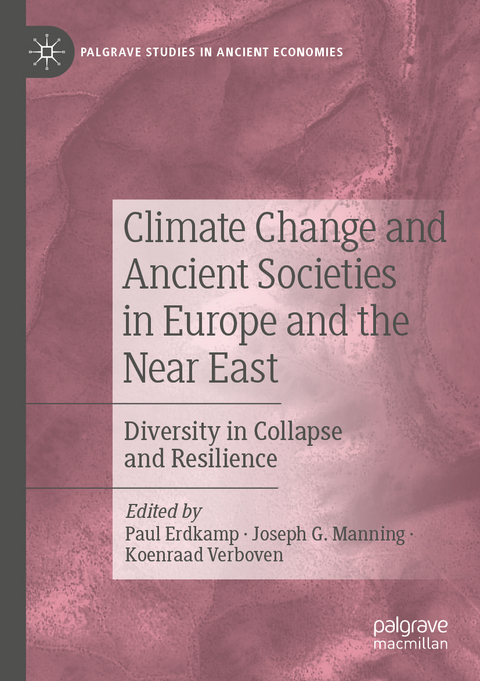
Climate Change and Ancient Societies in Europe and the Near East
Springer International Publishing (Verlag)
978-3-030-81105-1 (ISBN)
Climate change over the past thousands of years is undeniable, but debate has arisen about its impact on past human societies. This book explores the link between climate and society in ancient worlds, focusing on the ancient economies of western Eurasia and northern Africa from the fourth millennium BCE up to the end of the first millennium CE.
This book contributes to the multi-disciplinary debate between scholars working on climate and society from various backgrounds. The chronological boundaries of the book are set by the emergence of complex societies in the Neolithic on the one end and the rise of early-modern states in global political and economic exchange on the other. In order to stimulate comparison across the boundaries of modern periodization, this book ends with demography and climate change in early-modern and modern Italy, a society whose empirical data allows the kind of statistical analysis that is impossible for ancient societies.
The book highlights the role of human agency, and the complex interactions between the natural environment and the socio-cultural, political, demographic, and economic infrastructure of any given society. It is intended for a wide audience of scholars and students in ancient economic history, specifically Rome and Late Antiquity.Paul Erdkamp is Professor in Ancient History at Vrije Universiteit Brussels, Belgium. He teaches Ancient History, specializing in the Roman World, with a particular interest in economy, food supply, historiography, and environmental and social aspects of army and war. Joseph G. Manning is Professor of Classics and Professor of History and Senior Research Scholar in Law at Yale University, New Haven, USA. He specializes in Hellenistic history with particular focus on the legal and economic history of Ptolemaic Egypt. Koenraad Verboven is Professor of Ancient History at the University of Ghent, Belgium. He specializes in ancient social and economic history, particularly of the Roman world, and has a special interest in monetary history and numismatics, friendship and patronage based networks, guilds (collegia), (neo-)institutional analysis and complexity economics.
1. Chapter 1: A historian's introduction to paleoclimatology.- Chapter 2: A hard row to hoe. Climate change from the crop perspective.- Chapter 3: Who follows the elephant will have problems. Thought on modelling Roman responses to climate (changes).- Chapter 4: Famines, demographic crises and climate in Italy, 1650-1913.- Chapter 5: Collapse and resilience in prehistoric archaeology: Questioning concepts and causalities in models of climate-induced societal transformations.- Chapter 6: Climate, state building and political change in Egypt during the Early Bronze Age: a direct relation?.- Chapter 7: Vulnerability to climate change in Late Bronze Age Peloponnese (Greece).- Chapter 8: Saving up for a rainy day? Climate events, human-induced processes, and their potential effects on people's coping strategies in the Mycenaean Argive Plain, Greece.- Chapter 9: Peloponnesian land-use dynamics and climate variability in the first millennium BCE.- Chapter 10: Volcanic eruptions, veiled Suns, and Nile failure in Egyptian history: Integrating hydroclimate into understandings of historical change.- Chapter 11: The environmental imperialism of the Roman Empire in northwestern Europe.- Chapter 12: Seasonal drought on Roman rivers: transport vs. irrigation.- Chapter 13: The Antonine crisis: Climate change as a potential trigger for epidemiological and economic turmoil.- Chapter 14: Climate change and the productive landscape in the Mediterranean region in the Roman period.- Chapter 15: Viticulture as a climate proxy for the Roman world? Global warming as a comparative framework for interpreting the ancient source material in Italy and the West (ca. 200 BC-AD 200).- Chapter 16: Risks for farming families in the Roman World.- Chapter 17: Figures in an imperial landscape. Ecological and societal factors on settlement patterns and agriculture in Roman Italy.- Chapter 18: Hydrological changes in Late Antiquity: spatio-temporal characteristics and socio-economic impacts in the Eastern Mediterranean.- Chapter 19: Resilience and adaptation at the end of Antiquity. An evaluation of the impact of climate change in Late Roman western-central Anatolia.- Chapter 20: The social metabolism of past societies. A new approach to environmental changes and societal responses in the territory of Sagalassos (Turkey).
| Erscheinungsdatum | 09.11.2022 |
|---|---|
| Reihe/Serie | Palgrave Studies in Ancient Economies |
| Zusatzinfo | LVI, 623 p. 94 illus., 59 illus. in color. |
| Verlagsort | Cham |
| Sprache | englisch |
| Maße | 148 x 210 mm |
| Gewicht | 876 g |
| Themenwelt | Geschichte ► Teilgebiete der Geschichte ► Wirtschaftsgeschichte |
| Naturwissenschaften ► Biologie ► Ökologie / Naturschutz | |
| Wirtschaft ► Allgemeines / Lexika | |
| Weitere Fachgebiete ► Land- / Forstwirtschaft / Fischerei | |
| Schlagworte | Ancient economies • Climate change and human history • Climate-induced societal transformations • Collapse of past societies • Roman Empire • Roman responses to climate |
| ISBN-10 | 3-030-81105-0 / 3030811050 |
| ISBN-13 | 978-3-030-81105-1 / 9783030811051 |
| Zustand | Neuware |
| Informationen gemäß Produktsicherheitsverordnung (GPSR) | |
| Haben Sie eine Frage zum Produkt? |
aus dem Bereich


